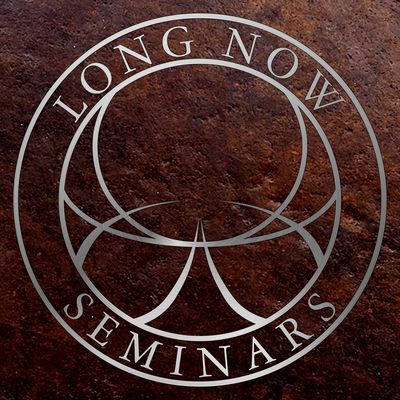Explore hundreds of lectures by scientists, historians, artists, entrepreneurs, and more through The Long Now Foundation's award-winning lecture series, curated and hosted by Long Now co-founder Stewart Brand (creator of the Whole Earth Catalog). Recorded live in San Francisco each month since 02003, past speakers include Brian Eno, Neil Gaiman, Sylvia Earle, Daniel Kahneman, Jennifer Pahlka, Steven Johnson, and many more. Watch video of these talks and learn more about our projects at Longnow.org. The Long Now Foundation is a non-profit dedicated to fostering long-term thinking and responsibility.
http://longnow.org/
Gesamtlänge aller Episoden: 14 days 10 hours 1 minute
Peter Diamandis: Long-term X-Prizes
Prizes are proving themselves as powerful tools to accelerate goal-specific innovation. Diamandis, the founder and chairman of the X Prize Foundation, has built on the success of the $10 million Ansari X Prize that inaugurated private-sector spaceflight in 2004 with Burt Rutan's SpaceShipOne. Currently in play are new prizes for a $10,000 human genome, for a private Moon landing, and for a super-efficient car, with more in the pipeline...
Neal Stephenson: ANATHEM Book Launch Event
At an event hosted by the Long Now Foundation, science fiction author Neal Stephenson reads from his latest novel Anathem.
Daniel Suarez: Daemon: Bot-mediated Reality
The viral success story of the year is a techno-thriller called Daemon. Software developer Suarez printed the book himself after being turned down by mainstream publishers. Blog raves, Amazon raves, and brief item in Wired magazine turned the book deservedly into a runaway hit...
Edward Burtynsky: The 10,000-year Gallery
Burtynsky's massively informative photographs change minds and influence policy. They are also exquisite art. Their historical value will grow with time. Other art has similar reach. There should be a gallery that collects, displays, and sifts such works over centuries and millennia, and develops ways to preserve them. That is exactly Burtynsky's plan--- a 10,000-year Gallery to accompany the 10,000-year Clock. His presentation will explore and demonstrate the idea...
Paul Ehrlich: The Dominant Animal: Human Evolution and the Environment
Everything living evolves, but humans evolve culturally as well as biologically, and that puts us in a peculiar relation to the rest of life, with a peculiar responsibility. If we can understand how cultural evolution works, we'll have a better handle on how to manage our responsibilities. The question that Ehrlich has been exploring lately is whether cultural evolution really does show patterns that would yield predictive theory...
Iqbal Quadir: Technology Empowers the Poorest
Quadir is the now-legendary founder of GrameenPhone, which transformed his home country of Bangladesh in the 1990s and led the way for the cellphone revolution throughout the developing world. Currently Quadir heads the Legatum Center for Development and Entrepreneurship at MIT and is building Emergence BioEnergy Inc., a project to develop local electricity for the rural poor, using such devices as a fuel cell that runs on anaerobic bacteria...
Niall Ferguson, Peter Schwartz: Historian vs. Futurist on Human Progress
Distinguished historian Ferguson and renowned futurist Schwartz disagree profoundly on the nature of human progress. Both use scenarios (called "counterfactual history" by Ferguson) to analyze how events play out. Ferguson wrote The War of the World (2006), a history of the violence that defined the 20th Century. Schwartz wrote The Art of the Long View (1991), the standard text on scenario planning, and The Long Boom (1999), on global prosperity in the 21st century...
Niall Ferguson, Peter Schwartz: Historian vs. Futurist on Human Progress
Distinguished historian Ferguson and renowned futurist Schwartz disagree profoundly on the nature of human progress. Both use scenarios (called "counterfactual history" by Ferguson) to analyze how events play out. Ferguson wrote The War of the World (2006), a history of the violence that defined the 20th Century. Schwartz wrote The Art of the Long View (1991), the standard text on scenario planning, and The Long Boom (1999), on global prosperity in the 21st century...
Craig Venter: Joining 3.5 Billion Years of Microbial Invention
With his current series of breakthroughs in synthetic biology Craig Venter and his team are not so much creating life as joining life. Reverse-engineering evolution's long-refined tricks and subtleties at the molecular level is building humanity's most powerful toolkit yet. Through shotgun-sequencing whole microbial populations ("metagenomics"), the domain of the organisms that rule the world is at last opening up...
Craig Venter: Joining 3.5 Billion Years of Microbial Invention
With his current series of breakthroughs in synthetic biology Craig Venter and his team are not so much creating life as joining life. Reverse-engineering evolution's long-refined tricks and subtleties at the molecular level is building humanity's most powerful toolkit yet. Through shotgun-sequencing whole microbial populations ("metagenomics"), the domain of the organisms that rule the world is at last opening up...
